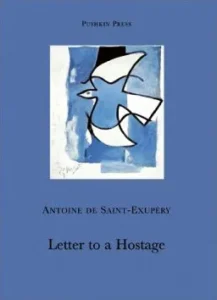“Little Prince” Author Antoine de Saint-Exupéry, the Sahara Desert, and the Meaning of Life
INSPIRATIONAL, 16 Oct 2023
Maria Popova | The Marginalian – TRANSCEND Media Service
 In December of 1940, a little more than two years before he created The Little Prince on American soil and four years before he disappeared over the Bay of Biscay never to return, Antoine de Saint-Exupéry (June 29, 1900–July 31, 1944) began writing Letter to a Hostage (public library) while waiting in Portugal for admission into the United States, having just escaped his war-torn French homeland — a poignant meditation on the atrocities the World War was inflicting at the scale of the human soul, exploring questions of identity, belonging, empathy, and the life of the spirit amidst death.
In December of 1940, a little more than two years before he created The Little Prince on American soil and four years before he disappeared over the Bay of Biscay never to return, Antoine de Saint-Exupéry (June 29, 1900–July 31, 1944) began writing Letter to a Hostage (public library) while waiting in Portugal for admission into the United States, having just escaped his war-torn French homeland — a poignant meditation on the atrocities the World War was inflicting at the scale of the human soul, exploring questions of identity, belonging, empathy, and the life of the spirit amidst death.
One of the most timelessly moving sections of the book, both for its stand-alone wisdom and for its evident legacy as a sandbox for the ideas the beloved author later included in The Little Prince — home, solitude, the stars, the sustenance of the spirit — is the second chapter, written while Saint-Exupéry was traveling aboard the crowded ship that took him from Lisbon to New York:
I lived three years in the Sahara. I also, like so many others, have been gripped by its spell. Anyone who has known life in the Sahara, its appearance of solitude and desolation, still mourns those years as the happiest of his life. The words “nostalgia for sand, nostalgia for solitude, nostalgia for space” are only figures of speech, and explain nothing. But for the first time, on board a ship seething with people crowded upon one another, I seemed to understand the desert.
Saint-Exupéry contemplates the psychology of boredom which, far from the creative force Susan Sontag believed it to be, takes on a wholly different meaning in the desert:
There, one perpetually bathes in the conditions for sheer boredom. And yet invisible divinities build up a net of directions, slopes and signs, a secret and living frame. No more uniformity. Everything takes up a definite position. Even one silence is unlike another silence.

He reflects on the Sahara’s peculiar place in the cultural history of silence:
There is a silence of peace, when the tribes are reconciled, when the evening once more brings its coolness, and it seems as if one had furled the sails and taken up moorings in a quiet harbor.
There is silence of the noon, when the sun suspends all thought and movement. There is a false silence when the north wind has dropped, and the appearance of insects, drawn away like pollen from their inner oasis, announces the eastern storm, carrier of sand. There is silence of intrigue, when one knows that a distant tribe is brooding. There is a silence of mystery, when the Arabs join up in their intricate cabals. There is a tense silence when the messenger is slow to return. A sharp silence when, at night, you hold your breath to listen. A melancholic silence when you remember those you love.
He considers how the vastness of the desert anchors one to a sense of belonging and pulls that inner wholeness apart at the same time:
Everything is polarized. Each star shows a real direction. They are all Magi’s stars. They all serve their own God. This one marks a distant well, difficult to reach. And the distance to that well weighs like a rampart. That one denotes the direction of a dried-up well. And the star itself looks dry. And the space between the star and the dried well does not lessen. The other star is a sign-post to the unknown oasis which nomads have praised in songs, but which dissent forbids you. And the sand between you and the oasis is a lawn in a fairy tale. That other one shows the direction of a white city of the South, which seems as delicious as a fruit to munch. Another points to the sea. Lastly this desert is magnetized from afar by two unreal poles: a childhood home, remaining alive in the memory. A friend we know nothing about, except that he exists.
So you feel strained and enlivened by the field of forces which attract or repel you, entreat or resist you. There you are, well-founded, well-determined, well-established in the center of cardinal directions.
And as the desert offers no tangible riches, as there is nothing to see or hear in the desert, one is compelled to acknowledge, since the inner life, far from falling asleep, is fortified, that man is first animated by invisible solicitations. Man is ruled by Spirit. In the desert I am worth what my divinities are worth.
What beautiful symmetry between this meditation and Saint-Exupéry’s most famous line from The Little Prince: “What is essential is invisible to the eye.”

Saint-Exupéry, who opens the chapter by observing that “the essential is that somewhere there remains the relics of one’s existence,” returns to the complexities of home and belonging:
France … was for me neither an abstract divinity, nor a historian’s concept, but a real flesh on which I depended, a network of links governing me, a mass of poles directing the inclinations of my heart. I needed to feel those I wanted to direct me more reliable and steady than myself. To know where to return. To be able to exist.
[…]
The Sahara may be more lively than a capital, and the most crowded city is deserted if the essential poles of life lose their magnetism.
Small as it may be, Letter to a Hostage is a monumental read and the most direct surviving glimpse of Saint-Exupéry’s boundless mind and spirit. Complement it with his original watercolors for The Little Prince, which exude a great deal of the Sahara sensibility he so cherished.
_______________________________________
 My name is Maria Popova — a reader, a wonderer, and a lover of reality who makes sense of the world and herself through the essential inner dialogue that is the act of writing. The Marginalian (which bore the unbearable name Brain Pickings for its first 15 years) is my one-woman labor of love, exploring what it means to live a decent, inspired, substantive life of purpose and gladness. Founded in 2006 as a weekly email to seven friends, eventually brought online and now included in the Library of Congress permanent web archive, it is a record of my own becoming as a person — intellectually, creatively, spiritually, poetically — drawn from my extended marginalia on the search for meaning across literature, science, art, philosophy, and the various other tendrils of human thought and feeling. A private inquiry irradiated by the ultimate question, the great quickening of wonderment that binds us all: What is all this? (More…)
My name is Maria Popova — a reader, a wonderer, and a lover of reality who makes sense of the world and herself through the essential inner dialogue that is the act of writing. The Marginalian (which bore the unbearable name Brain Pickings for its first 15 years) is my one-woman labor of love, exploring what it means to live a decent, inspired, substantive life of purpose and gladness. Founded in 2006 as a weekly email to seven friends, eventually brought online and now included in the Library of Congress permanent web archive, it is a record of my own becoming as a person — intellectually, creatively, spiritually, poetically — drawn from my extended marginalia on the search for meaning across literature, science, art, philosophy, and the various other tendrils of human thought and feeling. A private inquiry irradiated by the ultimate question, the great quickening of wonderment that binds us all: What is all this? (More…)
Go to Original – themarginalian.org
Tags: Antoine de Saint-Exupéry, Inspirational, Life, Philosophy, Spirituality, The Little Prince, Wisdom
DISCLAIMER: The statements, views and opinions expressed in pieces republished here are solely those of the authors and do not necessarily represent those of TMS. In accordance with title 17 U.S.C. section 107, this material is distributed without profit to those who have expressed a prior interest in receiving the included information for research and educational purposes. TMS has no affiliation whatsoever with the originator of this article nor is TMS endorsed or sponsored by the originator. “GO TO ORIGINAL” links are provided as a convenience to our readers and allow for verification of authenticity. However, as originating pages are often updated by their originating host sites, the versions posted may not match the versions our readers view when clicking the “GO TO ORIGINAL” links. This site contains copyrighted material the use of which has not always been specifically authorized by the copyright owner. We are making such material available in our efforts to advance understanding of environmental, political, human rights, economic, democracy, scientific, and social justice issues, etc. We believe this constitutes a ‘fair use’ of any such copyrighted material as provided for in section 107 of the US Copyright Law. In accordance with Title 17 U.S.C. Section 107, the material on this site is distributed without profit to those who have expressed a prior interest in receiving the included information for research and educational purposes. For more information go to: http://www.law.cornell.edu/uscode/17/107.shtml. If you wish to use copyrighted material from this site for purposes of your own that go beyond ‘fair use’, you must obtain permission from the copyright owner.
